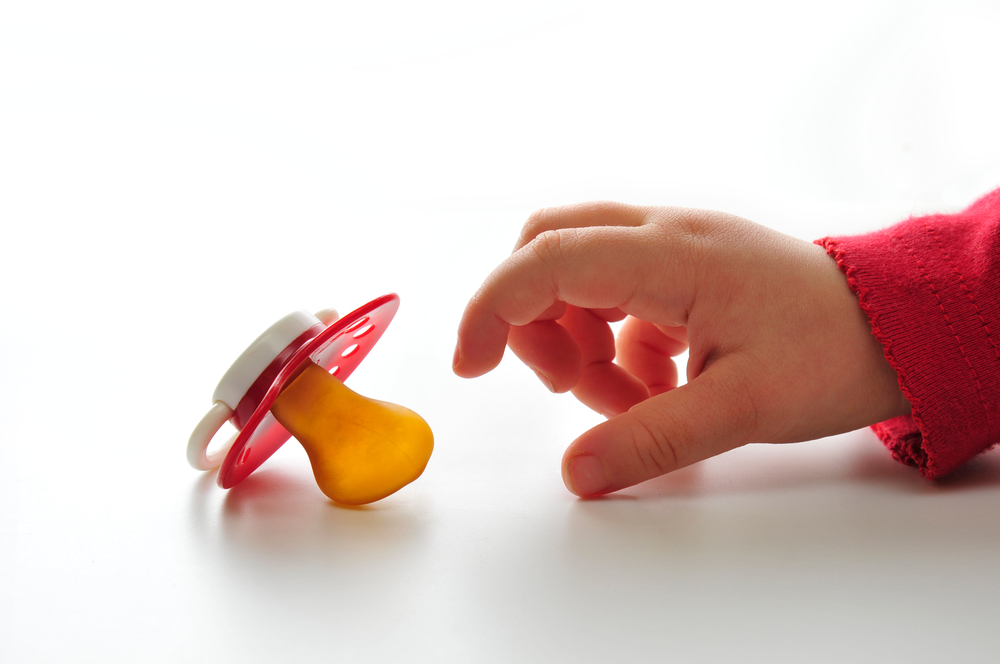Your child’s ability to self-soothe by use of a pacifier is both a blessing and a curse. If you’re concerned that your bill for future braces increases with each time your little one pops in their pacifier, there’s no need to worry. Most dentists can agree that pacifiers are completely fine for babies to use as long as the habit doesn’t go on for too long.
In fact, the American Academy of Pediatric Dentistry recommends the use of pacifiers over thumb or finger sucking. After all, a pacifier habit is easier to break at an earlier age, and your child’s fingers will always be available to them.
When To Take Away The Pacifier
Most experts advise that it’s best to put an end to pacifiers by age three at the latest, but closer to age two is better. Pacifier habits beyond the age of three can lead to crooked teeth and can change the shape and formation of the palate. Sucking opens the bite for babies as well, but if the habit is stopped early enough, it will return to normal with time.
In turn, stopping too early while there is still a strong desire to suck can be worse. A child who still requires the comforts of sucking to self-soothe will likely find their fingers or thumb as a replacement. Finger sucking tends to be a harder habit to break for many parents.
Avoiding Pacifier Teeth
Pacifiers are incredibly beneficial for young babies, as well as a benefit for parents. By stopping the habit at the age-appropriate time, parents can avoid the risk of their child developing pacifier teeth. Young babies who use pacifiers are proven to have a reduced risk of sudden infant death syndrome (SIDS) in addition to self-soothing. By the age of two, some dental effects can be seen; however, the most considerable changes appear in children older than four years of age. Avoid pacifier teeth by breaking the habit at the appropriate time and age for your child.
Effects of Pacifiers
During the first year and a half of your child’s life, sucking on a pacifier will not lead to any long-term damage to their developing mouth. However, frequent and continued sucking past that can cause irreversible damage that requires orthodontic treatment. It is also unclear if orthodontic pacifiers are better for future teeth. We recommend the use of smaller pacifiers as opposed to larger ones, but both will open the bite in the long run.
The most common issue seen with extended pacifier use is a space in the front teeth or an overbite. Children who use pacifiers past their toddler years are more likely to need braces and other dental work to correct issues that often include:
- Top front teeth that slant outwards
- Bottom teeth that tilt inwards
- Misaligned jaw
- The misshapen roof of the mouth
Pacifiers Vs. Thumb Sucking
It may seem as though thumb-sucking is the safer alternative to pacifiers, but for a few important reasons, the AAPD recommends the use of pacifiers over thumbs. When the time comes to discourage the habit of sucking to avoid future dental issues, it’s significantly easier to control pacifier use that it is to prevent thumb or finger sucking.
Tips For Breaking The Habit
Children become incredibly dependent on pacifiers, and it can be difficult for parents to make the first steps towards taking it away. If your child is old enough, the best thing to do is to create a plan that works for your situation and your child. Some parents find it easier to have their child quit the habit cold-turkey, while others try a more gradual approach, including safely snipping the end of the pacifier off to make it less satisfying to suck on.
We want your child to have a healthy, beautiful smile. Thomas Orthodontics is always happy to speak with children about what happens to their teeth if they keep using a pacifier, and to offer encouragement. Call us today for further resources on pacifiers and your child’s developing smile.






